Demolition Contractors Flower Mound
Top Demolition Services in Flower Mound
Get up to 3 Demolition Companies quotes for your project today! Compare profiles, reviews, accreditations, portfolio, etc... and choose the best offer.
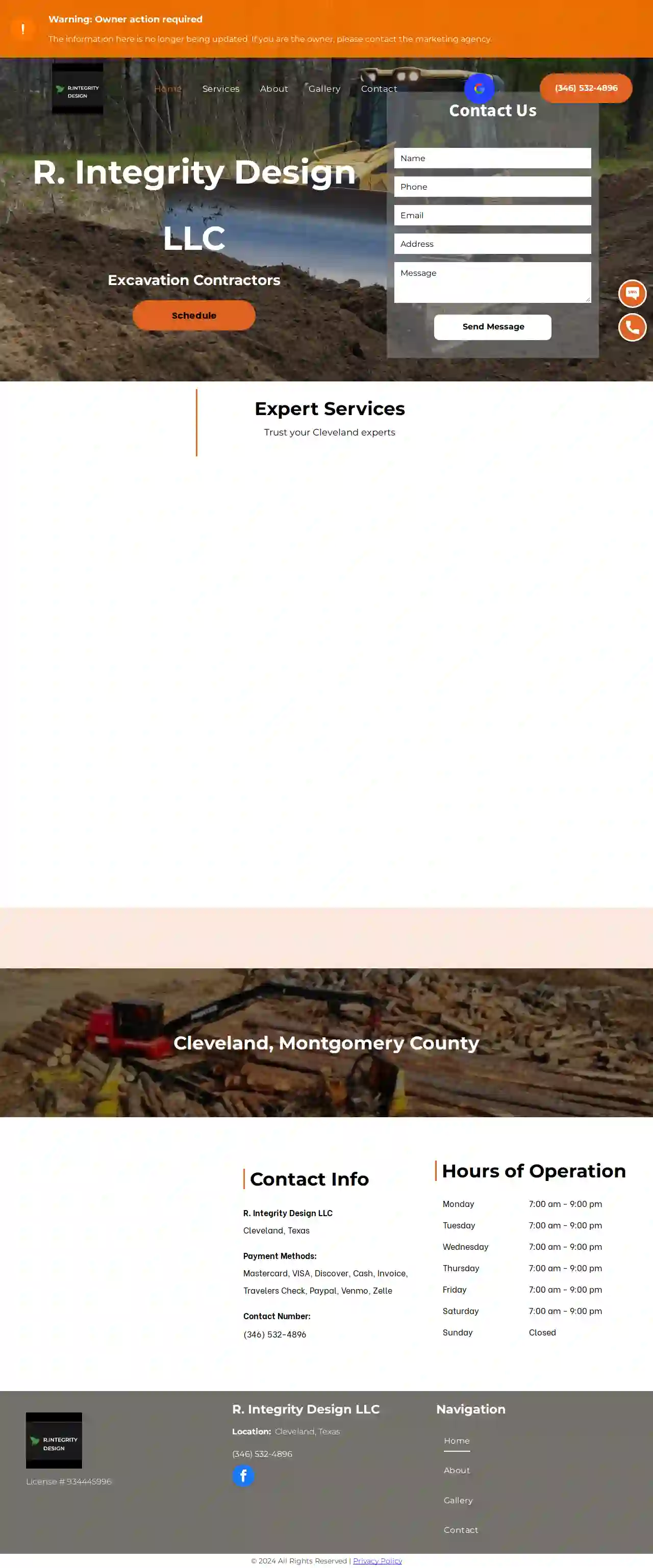
R. Integrity Design LLC
55 reviewsCleveland, Texas, USIntroducing R. Integrity Design LLC Are you looking for an experienced excavation contractor in Cleveland, TX? At R. Integrity Design LLC, our excavation services are rooted in a steadfast commitment to customer satisfaction. For over two decades, we have ensured that every project we undertake meets the highest standards of quality and safety. We understand the critical role that site preparation plays in any construction project, whether it's for a cozy home or a sprawling commercial complex. Our quick service doesn’t compromise on quality, and our reputation for great customer service is a testament to our client commitments. Our range of services is as diverse as our client base. From precise site clearing that paves the way for new beginnings to demolition services that carefully dismantle the old, we handle each task with unparalleled expertise. Our team excels in land demolition, clearing sites with efficiency and safety. We provide essential grading services like regrading and resloping to lay the ideal foundation for your construction. In construction demolition, we’re meticulous, ensuring precision in every phase. Our subgrade stabilization strengthens the base of your projects, and we’re adept at constructing retention walls, crucial for soil erosion and water flow control in civil constructions. Our work in specialized projects like railroad sighting, railroad yards, and railroad crossings showcases our versatility and ability to tackle complex tasks. We provide materials like gravel, crushed concrete, and limestone, integral to various construction phases. What sets R. Integrity Design LLC apart is our unwavering dedication to delivering exceptional service at great prices. We offer free estimates, ensuring transparency right from the start. For top-notch excavation services in Cleveland, TX, choose R. Integrity Design LLC. We're ready to bring your construction visions to life with our expertise. Reach out for a free estimate and discover why we're a go-to contractor in the industry. Together, let's create something outstanding.
- Services
- Why Us?
- Gallery
Get Quote
Excavating & Drainage Solutions
511 reviews1501 E Griffiths Ave, Springfield, 62702, USExcavating & Drainage Solutions is Springfield, IL’s leading choice for residential and commercial projects. Our staff has decades of experience in the water and ground excavation industry to handle projects of all sizes. We specialize in a wide range of services from pond building and soil grading for new construction projects to laying concrete for homes and businesses in the area. Excavating ensures the proper removal and tunneling of soil, rock, or other materials to aid in construction or plumbing projects. When you choose Excavating & Drainage Solutions, we tackle your project from the first blueprint designs to the trenching of your projects. Contact us today to learn more about our services and receive a free estimate of your excavation job. Excavating & Drainage Solutions is the leading expert in construction, concrete, and excavation services for customers in Springfield, IL. Our team recognizes the importance of having a trained team when working on your excavation, drainage, or concrete project. We have decades of combined experience in the industry to provide high-end and long-lasting results to our residential and commercial clients. From basement excavation projects to installing drainage systems for local businesses, you can rely on us for step-by-step guidance until your project is complete. Get in touch with our team today for a free consultation to discuss your excavation needs. Wastewater solutions are required for every residential and commercial project. From sewer to septic design, installation, inspection, maintenance, repair, and replacement, our commitment to quality customer service and the health of our customers and the environment, makes Excavating and Drainage Solutions the consistent top choice for: NEW CONSTRUCTION RESIDENTIAL COMMERCIAL MUNICIPAL AGRICULTURAL In order to minimize the likelihood of basement backups the City of Springfield has implemented an Overhead Sewer Program to assist city residents with the cost of plumbing modifications to their homes. This program applies to buildings constructed prior to May 1, 1975. At Excavating & Drainage Solutions in Springfield, IL, there is no limit to our capability. We have several years of experience in the construction and drainage industries to provide our residential and commercial clients with high-quality results. So whether you’re looking for freshly graded soil for your upcoming build project or need your driveway redone, you can count on our specialists to provide expert services every step.
- Services
- Why Us?
- Testimonials
- Gallery
Get Quote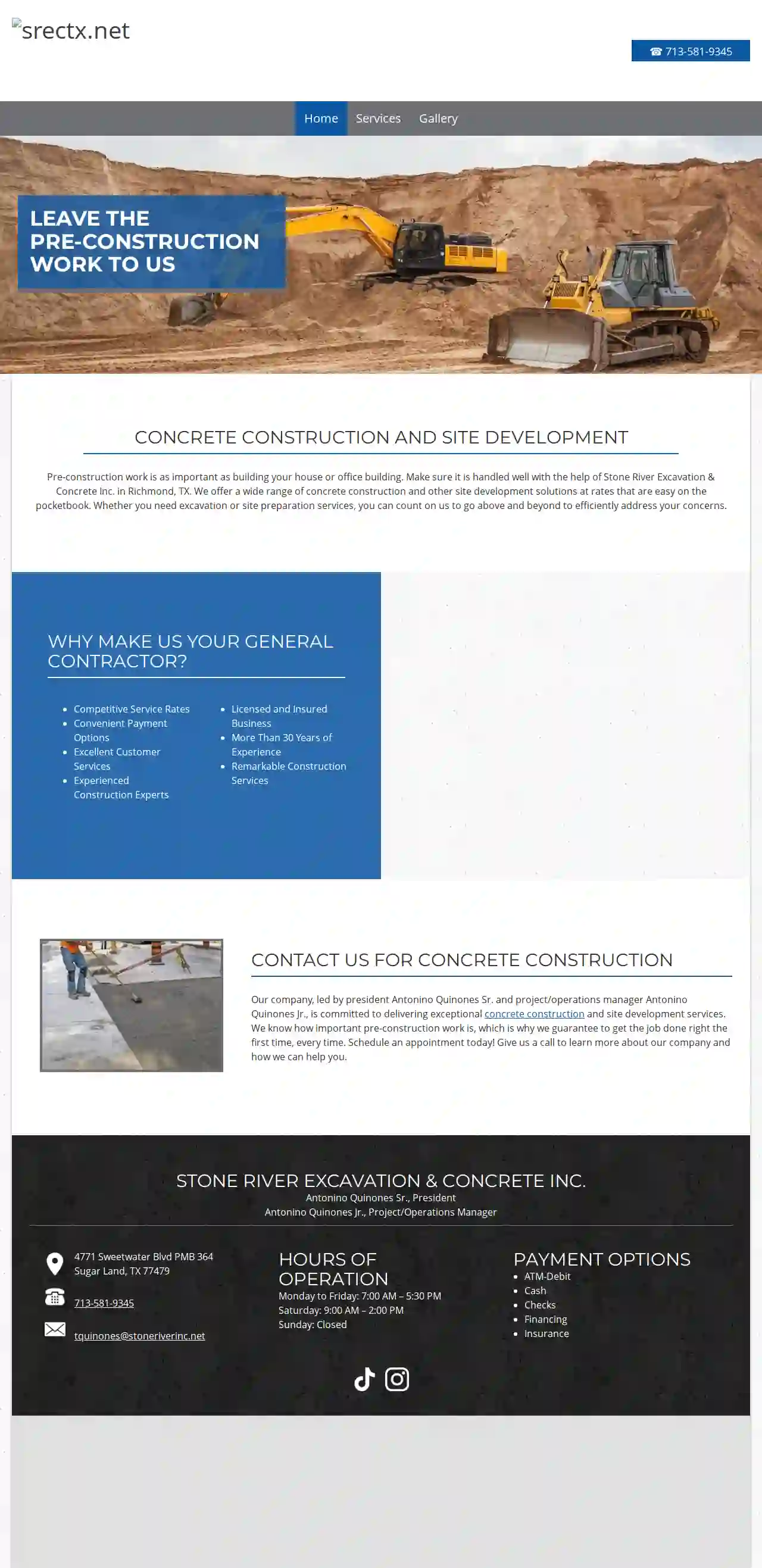
Stone River Excavation & Concrete
53 reviews4771 Sweetwater Blvd, PMB 364, 4771 Sweetwater Blvd PMB 364, Sugar Land, 77479, USStone River Excavation & Concrete Inc. - Your Trusted Partner for Pre-Construction Stone River Excavation & Concrete Inc. is a Richmond, TX based company specializing in concrete construction and site development. Led by Antonino Quinones Sr. (President) and Antonino Quinones Jr. (Project/Operations Manager), we are committed to delivering exceptional services. We understand the crucial role pre-construction plays in any project, ensuring a solid foundation for your house, office building, or any other structure. Our team is dedicated to getting the job done right the first time, every time. We offer a comprehensive range of services, including excavation, grading, concrete foundation building, headwall construction, parking lot construction, wingwall construction, retention pond construction, storm sewer installation, and more. We pride ourselves on our competitive service rates, convenient payment options, and exceptional customer service. With over 30 years of experience, our team of construction experts is fully licensed and insured, providing you with peace of mind. Contact us today to schedule an appointment and learn how we can help you with your pre-construction needs. We are dedicated to providing you with the highest quality services and exceeding your expectations.
- Services
- Why Us?
- Our Team
- Gallery
Get Quote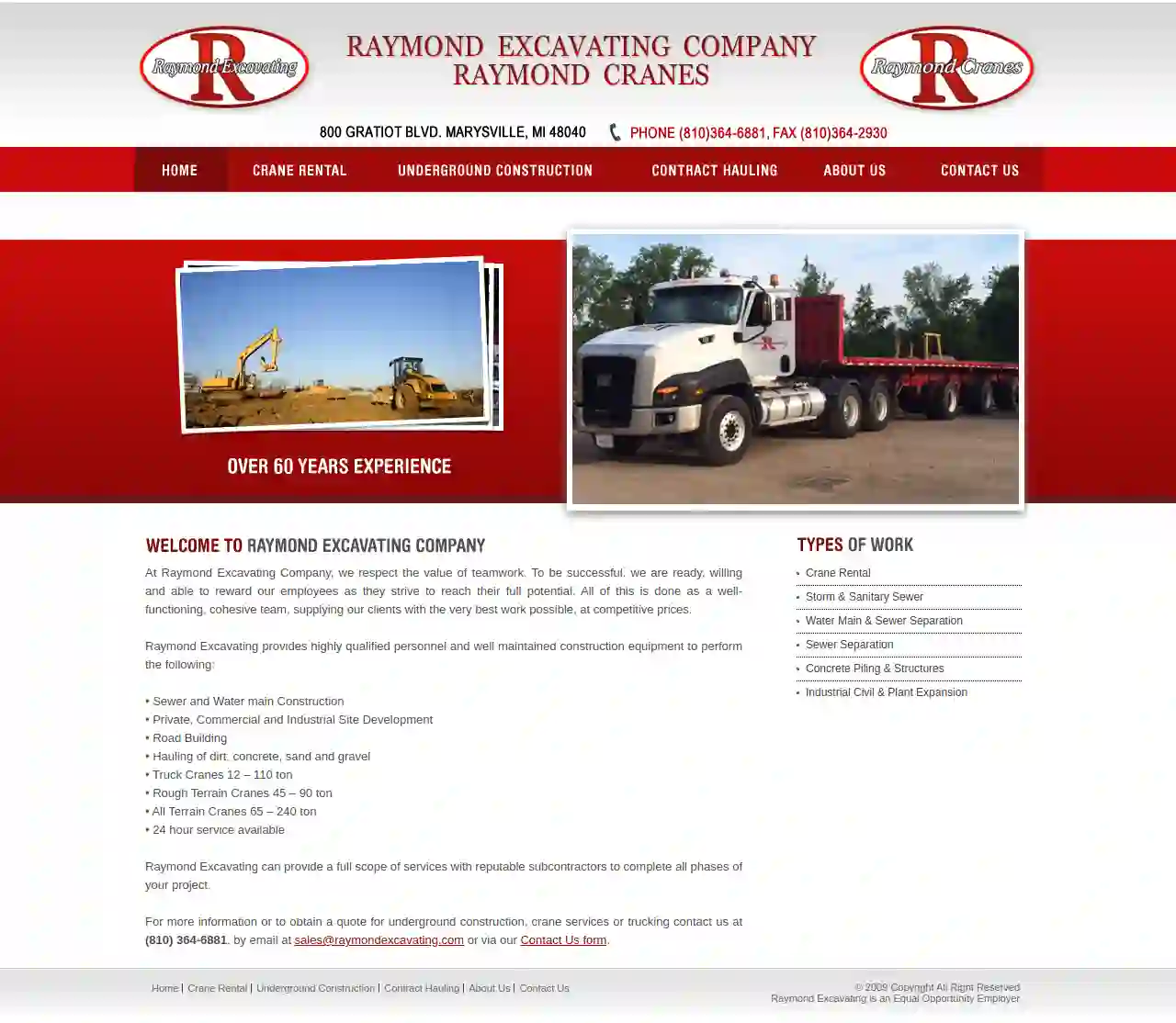
Raymond Excavating Co
56 reviews800 Gratiot Blvd., Marysville, 48040, USRaymond Excavating: Your Trusted Partner for Excavation and Construction Raymond Excavating Company is a privately owned corporation led by Dave Burgess, President, and Brandon Burgess, Vice President. Founded in 1954 by Raymond Burgess, we have been serving St. Clair County and surrounding areas with exceptional earthwork and underground utility services. Our commitment to teamwork, combined with highly qualified personnel and well-maintained equipment, ensures we deliver the highest quality work at competitive prices. We take pride in our long-standing reputation as a Michigan Department of Transportation prequalified contractor for over 35 years. Our experience spans a wide range of projects, including collaborations with the State of Michigan, St. Clair County, Macomb Township, City of Port Huron, City of Marysville, Marysville Ethanol LLC, DCP Midstream, Dupont, and various other municipalities. We have also partnered with the U.S. Corps of Engineers, private developers, and major industrial firms. Raymond Excavating is equipped to handle your project's needs with a diverse fleet of track excavators, dozers, rubber tired loaders, tractor backhoes, lifting cranes, and tractor/trailers. Our team is comprised of skilled and experienced professionals who are members of the Operating Engineers and Laborers Unions, ensuring a high level of expertise and dedication to safety. We are committed to providing a full scope of services, including reputable subcontractors, to complete all phases of your project. Whether you require underground construction, crane services, or trucking, we are here to meet your needs. Contact us today for a quote or to discuss your project requirements.
- Services
- Why Us?
- Our Team
- Gallery
Get Quote
Blake Excavation
511 reviews1383 Baldwin Road, Yorktown Heights, 10598, USAbout Blake Excavation Blake Excavation is a family-owned and operated business with over 25 years of experience in the excavation industry. We are committed to providing high-quality work at fair prices, with the highest levels of customer satisfaction. We are fully licensed and insured, and we are proud to serve the Yorktown Heights, NY community. We specialize in all phases of excavation, from land clearing and site work to foundation installation and retaining walls. We also offer a variety of other services, including: Residential Services: New Home Construction Land Clearing Site Work Retaining Walls Stone Work Septics Drainage Utilities Concrete Slabs Side Walks Curbs Pool installation and pool demolition Home demolition Dumpster Rental Tree Work and Stump Removal Snow plowing Property Maintenance Lawn Care Commercial Services: Land Clearing Site Work Retaining Walls Stone Work Foundation Installation Utilities Concrete Slabs Side Walks Curbs Dumpster Rental We are committed to providing our customers with the highest level of service. We listen to our customers to understand their needs and expectations, and we strive to exceed them at every turn. We offer free estimates and competitive pricing. If you are looking for a reliable and experienced excavation company in Yorktown Heights, NY, contact Blake Excavation today. We would be happy to discuss your project and provide you with a free estimate.
- Services
- Why Us?
- Gallery
Get Quote
Bicknell Excavating
53 reviewsPlano, USBicknell Excavating: A Family Legacy of Quality Bicknell Excavating is a local, family-owned and operated business run by father and sons. We are dedicated to making your project a success by exceeding expectations, valuing your time, and ensuring cost-efficiency. Our commitment to quality and customer satisfaction is deeply rooted in our family values. Taylor and Jordan Bicknell, driven by their passion for the industry, established Bicknell Excavating in 2020. Their dedication to learning the trade and honing their skills has resulted in a company that consistently delivers exceptional results. In 2021, Jordan joined Taylor in partnership, further strengthening their commitment to excellence. In 2024, their father, Kelly, retired and joined his sons in their business venture, bringing his wealth of experience in customer service, administration, and operations to the team. Together, they form a dynamic trio, combining their expertise to provide comprehensive and reliable excavation services. As resident Texans from the east Texas area, we understand the importance of delivering quality work on time. We are proud to serve our community with integrity and a commitment to exceeding expectations.
- Services
- Why Us?
- Our Team
- Testimonials
- Gallery
Get Quote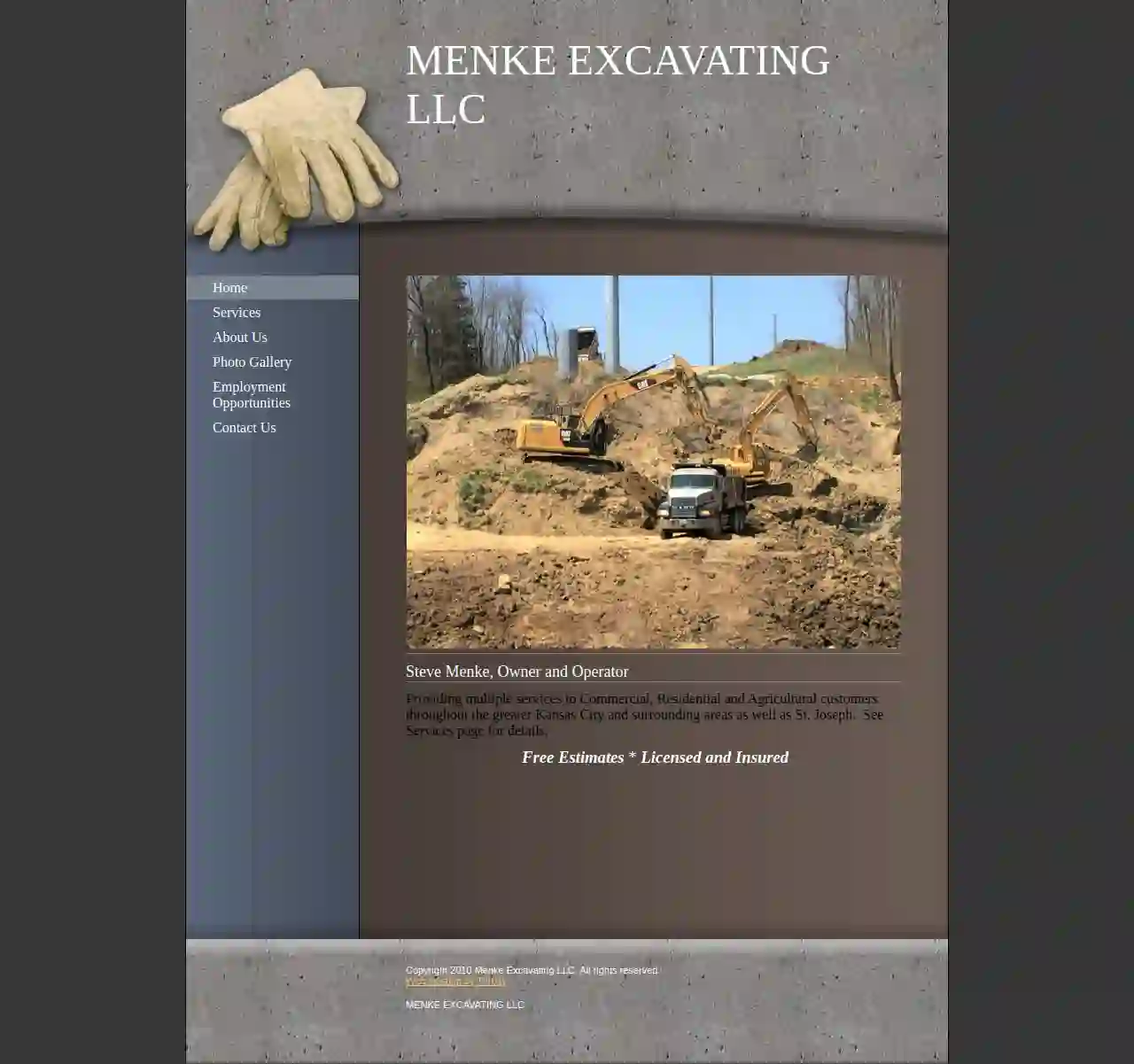
Menke Excavating
53 reviewsHouston, USAbout Menke Excavating LLC Menke Excavating LLC is a locally owned and operated business serving commercial, residential, and agricultural customers throughout the greater Kansas City area, including St. Joseph. We are committed to providing high-quality excavation and grading services at competitive prices. Our team of experienced professionals is dedicated to meeting your needs and exceeding your expectations. We are fully licensed and insured, and we offer free estimates on all projects. We are proud to serve our community and build lasting relationships with our clients. We believe in providing honest and transparent service, and we are always available to answer your questions and address your concerns.
- Services
- Why Us?
- Gallery
Get Quote
Superior Plumbing
583 reviews7113 W 135th St., Ste 246, 7113 W 135th St. Ste 246, Overland Park, 66223, USAbout us.... Over the past decade, Superior Plumbing has provided a top-tier Overland Park plumbing and gas repair alternative to the market place! We are a plumbing company in Overland Park, KS--"providing competitive pricing and clean work with a quality that is hard to match. " As a smaller, family owned and operated plumbing company, we provide personable, friendly service--seldom seen in the plumbing industry! Our Master Plumber has over 30 years of experience and training. We know it can be difficult to find a good plumber in Overland Park KS...that's why we are here! We’re here to help with all your plumbing projectsWe know it can be hard to find a good plumber in Overland Park, KS--that’s why we’re here! Our Master Plumber will give you advice that only years of experience and training can provide! Whether it is a busted water pipe, stopped-up drain, tricky leak, or a water heater problem- we are the plumbing company in Overland Park, KS to call! Our customers look forward to calling Superior Plumbing for all their plumbing repairs!Our Overland Park KS plumbers are well stocked and prepared... Every plumber with Superior Plumbing pays attention to the details, in order to guarantee the best results each time. For a plumber in Overland Park, KS--Superior Plumbing is the one-stop plumbing service contractor for all your needs, big or small. Our plumbing company is proud to be of service to the Overland Park community. When you need a plumber in Overland Park that you can trust, call Superior Plumbing. Precision plumbing repairs EACH time! With our extensive knowledge in plumbing and gas services, along with years of experience in carrying out quality plumbing installation and repair work, our team of plumbers in Overland Park KS take great care of both inside and outside your home. If you need help with any plumbing repairs, we’re the plumbing company in Overland Park to call! No obligation! Free estimates for your plumbing projects or plumbing repairs! We believe everyone deserves a quality plumber in Overland Park, one that will provide straight forward, upfront pricing about their plumbing issues. We provide each customer with an up front, no obligation, free estimate. We go even further, by providing a one-year warranty on our plumbing work giving you peace of mind every time! When we’re done, our plumbers leave behind quality work AND a clean job site. We live by our motto, “Clean Plumbing, Done Right!!”
- Services
- Why Us?
- Gallery
Get Quote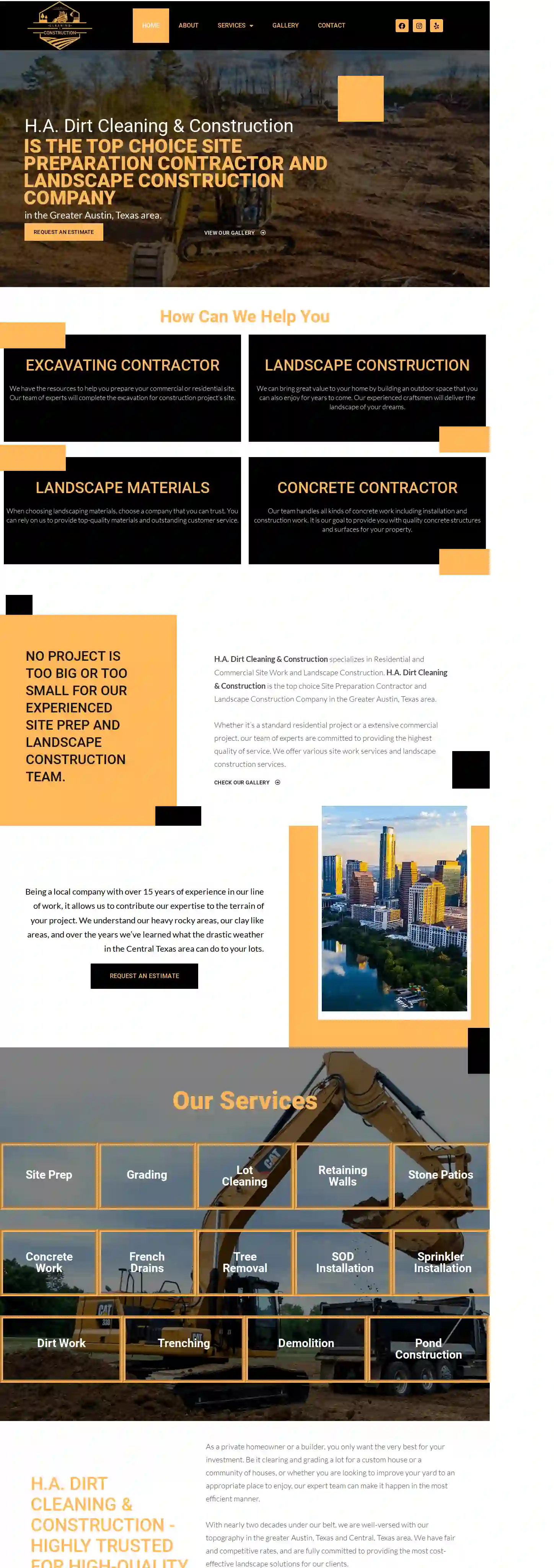
H.A. Dirt Cleaning & Construction
511 reviewsAustin, USH.A. Dirt Cleaning & Construction is the top choice Site Preparation Contractor and Landscape Construction Company in the Greater Austin, Texas area. H.A. Dirt Cleaning & Construction specializes in Residential and Commercial Site Work and Landscape Construction. Whether it’s a standard residential project or a extensive commercial project, our team of experts are committed to providing the highest quality of service. We offer various site work services and landscape construction services. Being a local company with over 15 years of experience in our line of work, it allows us to contribute our expertise to the terrain of your project. We understand our heavy rocky areas, our clay like areas, and over the years we’ve learned what the drastic weather in the Central Texas area can do to your lots. As a private homeowner or a builder, you only want the very best for your investment. Be it clearing and grading a lot for a custom house or a community of houses, or whether you are looking to improve your yard to an appropriate place to enjoy, our expert team can make it happen in the most efficient manner. With nearly two decades under our belt, we are well-versed with our topography in the greater Austin, Texas and Central, Texas area. We have fair and competitive rates, and are fully committed to providing the most cost-effective landscape solutions for our clients. You can rest assured that your project will be completed in a timely manner and with professionalism and outstanding customer service. No project is too big or too small for our experienced site prep and landscape construction team.
- Services
- Why Us?
- Gallery
Get Quote
Larson Excavating
59 reviewsLarkspur, CO, USMeet Larson Excavating! Welcome to Larson Excavating, where your construction and excavation needs are our top priority. We specialize in Material Delivery and Placement, Demolition, Excavation and Site Work, Utilities, and Roads and Driveways. As a family-owned and operated business, we take pride in catering to both residential and commercial clients with a wide range of services including bobcat services, shoring, and site clearing. Our story began in 2010. Since then, we have been deeply committed to serving the community of Larkspur, CO, and the surrounding regions. With over 23 years of experience in the industry, we bring a wealth of knowledge and expertise to every project we undertake. What sets us apart from the competition is not just our extensive range of services but also our core values of honesty, integrity, and dedication. We are an insured business that you can depend on for timely and reliable services. We value integrity and clarity in all aspects of our operations. Our excavation contractors are detail-oriented, prompt, and punctual. This efficiency and professionalism are part of our unwavering commitment to quality service. We understand that every project is unique, and we cater to the specific needs of our customers by offering friendly customer care along with knowledgeable support. Moreover, we ensure that all our services are affordable and competitively priced. If you are looking for excavation services that not only meet but exceed your expectations, Larson Excavating is the name to trust. Our customers’ satisfaction is our foremost concern, and we go the extra mile to ensure that you receive the best. To learn more about us or if you are interested in receiving a free estimate, don’t hesitate to call us now! Your journey towards successful construction and excavation projects begins here with us.
- Services
- Why Us?
- Gallery
Get Quote
Over 22,076+ Excavation Contractors on our platform
Our excavation companies operate in Flower Mound & beyond!
ExcavationHQ has curated and vetted the Best Excavation Contractors near Flower Mound. Find a trustworthy business today.
Frequently Asked Questions About Demolition Contractors
- Recycling: Concrete, brick, metal, and wood can be recycled and reused in other construction projects, reducing waste sent to landfills.
- Landfill Disposal: Non-recyclable materials are disposed of in designated landfills according to local regulations.
- Donation: Some materials, such as fixtures or appliances, may be suitable for donation to charitable organizations.
- General Liability Insurance: Covers bodily injury or property damage to third parties caused by the contractor's negligence.
- Workers' Compensation Insurance: Provides benefits to workers injured on the job.
- Pollution Liability Insurance: Covers costs associated with environmental contamination caused by demolition activities.
- Professional Liability Insurance: Protects against claims of negligence or errors in professional services, such as demolition planning or consulting.
- Feasibility Studies: Assessing the viability and challenges of a demolition project.
- Demolition Planning: Developing demolition plans, including method selection, sequencing, and safety procedures.
- Permitting Assistance: Navigating the demolition permitting process and ensuring compliance with regulations.
- Hazardous Material Surveys: Identifying and managing hazardous materials, such as asbestos and lead paint.
- Cost Estimating: Providing accurate cost estimates for demolition services.
- Project Management: Overseeing the demolition process and ensuring it proceeds as planned.
- Site Security: Secure the demolition site with fencing and warning signs to prevent unauthorized access.
- Personal Protective Equipment (PPE): Workers should wear appropriate PPE, including hard hats, safety glasses, gloves, and steel-toe boots.
- Hazardous Material Removal: Properly identify and remove asbestos, lead paint, or other hazardous materials before demolition begins.
- Utility Disconnections: Disconnect all utilities, such as electricity, gas, and water, before demolition.
- Controlled Demolition Techniques: Employ controlled demolition methods to minimize risks and ensure the structure comes down safely.
- Dust Control: Implement dust suppression measures, such as water spraying or misting, to reduce airborne particles and protect air quality.
- Emergency Planning: Have an emergency plan in place, including communication protocols and evacuation procedures, in case of unforeseen events.
What happens to the debris after demolition?
What is the importance of insurance in demolition projects?
What is the role of a demolition consultant?
What are the safety precautions for demolition?
What happens to the debris after demolition?
- Recycling: Concrete, brick, metal, and wood can be recycled and reused in other construction projects, reducing waste sent to landfills.
- Landfill Disposal: Non-recyclable materials are disposed of in designated landfills according to local regulations.
- Donation: Some materials, such as fixtures or appliances, may be suitable for donation to charitable organizations.
What is the importance of insurance in demolition projects?
- General Liability Insurance: Covers bodily injury or property damage to third parties caused by the contractor's negligence.
- Workers' Compensation Insurance: Provides benefits to workers injured on the job.
- Pollution Liability Insurance: Covers costs associated with environmental contamination caused by demolition activities.
- Professional Liability Insurance: Protects against claims of negligence or errors in professional services, such as demolition planning or consulting.
What is the role of a demolition consultant?
- Feasibility Studies: Assessing the viability and challenges of a demolition project.
- Demolition Planning: Developing demolition plans, including method selection, sequencing, and safety procedures.
- Permitting Assistance: Navigating the demolition permitting process and ensuring compliance with regulations.
- Hazardous Material Surveys: Identifying and managing hazardous materials, such as asbestos and lead paint.
- Cost Estimating: Providing accurate cost estimates for demolition services.
- Project Management: Overseeing the demolition process and ensuring it proceeds as planned.
What are the safety precautions for demolition?
- Site Security: Secure the demolition site with fencing and warning signs to prevent unauthorized access.
- Personal Protective Equipment (PPE): Workers should wear appropriate PPE, including hard hats, safety glasses, gloves, and steel-toe boots.
- Hazardous Material Removal: Properly identify and remove asbestos, lead paint, or other hazardous materials before demolition begins.
- Utility Disconnections: Disconnect all utilities, such as electricity, gas, and water, before demolition.
- Controlled Demolition Techniques: Employ controlled demolition methods to minimize risks and ensure the structure comes down safely.
- Dust Control: Implement dust suppression measures, such as water spraying or misting, to reduce airborne particles and protect air quality.
- Emergency Planning: Have an emergency plan in place, including communication protocols and evacuation procedures, in case of unforeseen events.